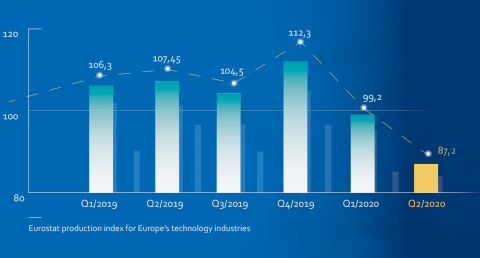Europe’s technology industries hit harder by Covid-19 than the 2008 financial crisis
9 October 2020
Vital for a resilient recovery
Orgalim issues half-yearly economic reports on the state of Europe’s technology industries, based on the latest Eurostat production index data (NACE Codes 25/26/27/28/33), compiled and analysed by Orgalim economists. This interim update builds on our first review of the impact of the Covid 19 crisis issued in May and comes ahead of our full half-year report due later this autumn.
"The latest figures confirm that the COVID-19 pandemic has had a severe impact on Europe’s technology industries, which are so central to ensuring a green, digital and resilient recovery," says Malte Lohan, Orgalim Director General. "We therefore reiterate our call for Europe’s leaders to help our industries, 90% of which are SMEs, so that they can survive and lead the way to building Europe’s technology leadership."
We call for Europe’s leaders to help our industries, 90% of which are SMEs, so that they can survive and lead the way to building Europe’s technology leadership.
A steep rebound proves brief
Digging deeper, our analysis shows that, while Europe’s technology industries quickly escaped the eye of the storm after the outbreak of the crisis, they continue to find themselves in a very fragile economic environment today. “As expected, there was a brief, steep rebound when lockdown measures eased in May, which partly made up for the deep slump in March and April,” explains Martin Baminger, chair of Orgalim’s Economics & Statistics Working Group. “However, this upswing soon ran out of steam because the global demand for industrial goods was unable to recover sustainably.”
The technology industries have been particularly hard hit because they are also being impacted by other factors not related to this crisis. Automotive production was well down before Covid 19 for structural reasons, and the demand for capital goods was also already on shaky ground before the crisis. Global protectionism, trade conflicts and technological upheavals have left their mark and will continue to be felt once the Covid 19 crisis subsides.
There was a brief, steep rebound when lockdown measures eased in May. However, this upswing soon ran out of steam because the global demand for industrial goods was unable to recover sustainably.
Can a structural crisis be avoided?
How structural will the consequences of the crisis be, and can Orgalim’s sectors emerge from this crisis faster than after the 2008 financial shock? A strong indicator as to whether the crisis turns into a long-lasting structural recession will be developments on the employment side. Ideally, companies in the technology industries will be able to keep their skilled staff working in order to avoid any brain drain and skill drain. However, given the low operating rates likely for at least some months, that will only be possible if substantial public funding continues to be forthcoming.
So far, Europe-wide government support measures have minimised job losses and bankruptcies. Job losses in Europe’s technology industries, with 11.5 million direct employees, are now expected to be up to 5% in 2020. While job-protection and liquidity support measures are expected to be gradually withdrawn, Europe’s technology industries count on massive investments from the European Recovery and Resilience Facility and related instruments to avoid a severe structural long-term crisis in Orgalim’s sectors.

LATEST NEWS
Orgalim welcomes Draghi's call for radical change to boost EU competitiveness
Former European Central Bank chief Mario Dragh...

